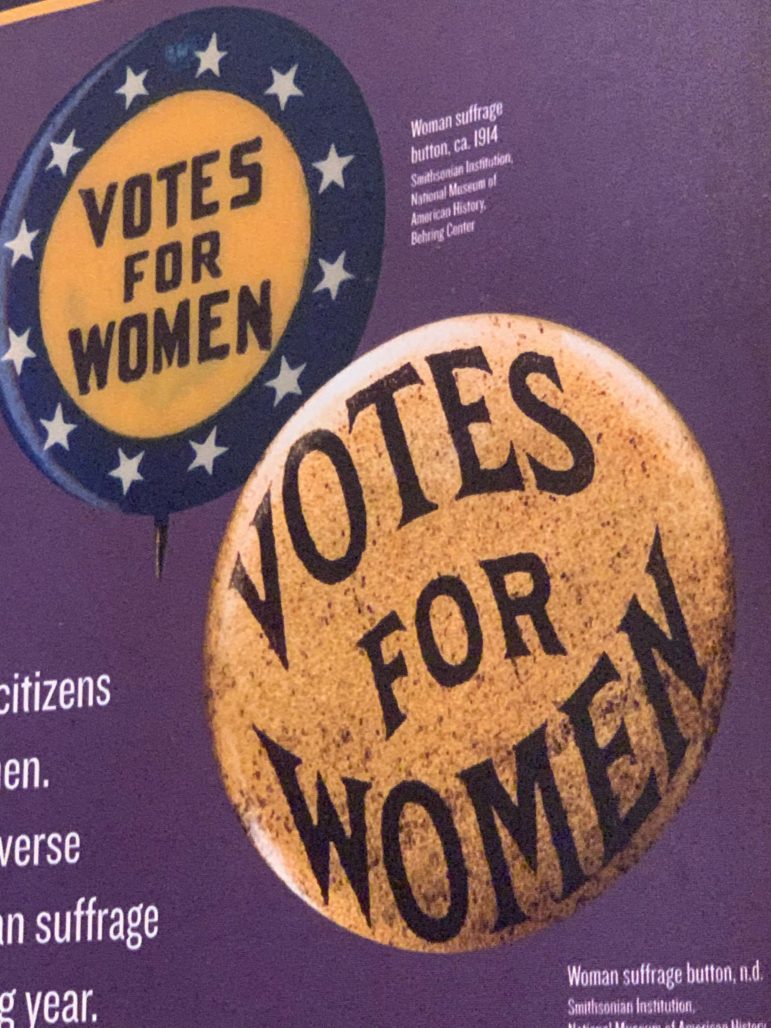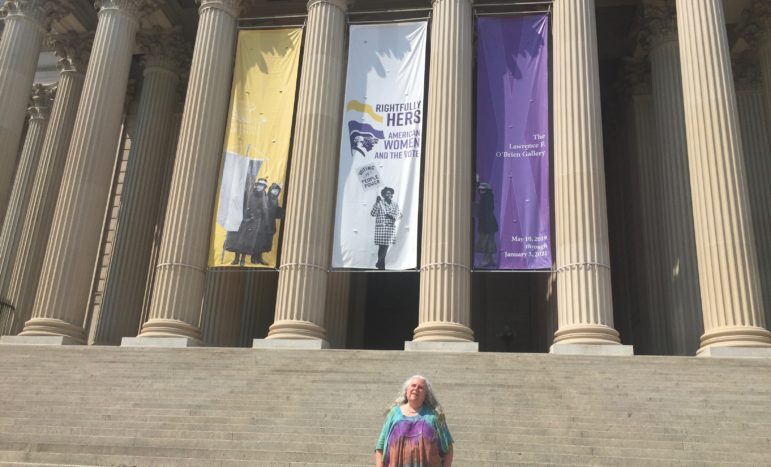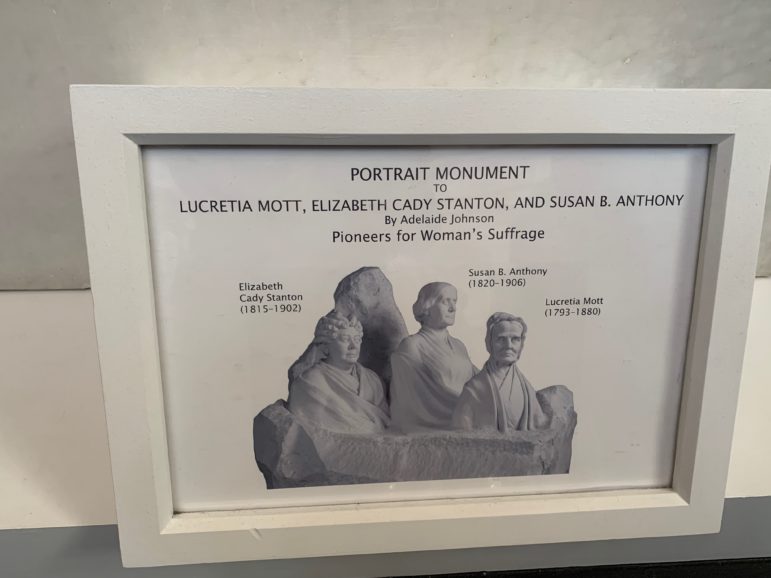This is part one of a two-part interview with Selena Fox on gender equality and the 19th amendment. Click here for part two.
TWH – The 19th amendment was passed by the U.S. Senate on June 4, 1919, ratified on August 19, 1920, and was officially added to the U.S. constitution 100 years ago today, on August 26.
The right of citizens of the United States to vote shall not be denied or abridged by the United States or by any State on account of sex.
Congress shall have power to enforce this article by appropriate legislation.
For the first time in the history of the United States, women were able to vote in the presidential election on November 2, 1920.

Buttons pictured on one of the panels of the U.S. Capitol’s 19th Amendment exhibit – Image credit: Selena Fox
It’s important to note that while the 19th Amendment was passed in 1920, many women of color still faced considerable obstacles when it came to voting. It was not until the Voting Rights Act was signed into law in 1965 that women of color could finally vote without being subject to a variety of harassment at the polls.
In 197o, a nationwide demonstration for women’s rights on August 26 renewed fight for equal rights. The first version of an Equal Rights Amendment was introduced in 1923 and would continue to be reintroduced every year through to 1972.
In 1971, a joint resolution by the U.S. Congress was first introduced to designate August 26 as Women’s Equality Day to commemorate the official enactment of the 19th Amendment. In 1972, President Richard M. Nixon issued Proclamation 4147 making August 26, Women’s Rights Day. A year later in 1973, the U.S. Congress would finally approve August 26 as Women’s Equality Day, and Nixon would issue Proclamation 4243 which every US president since would continue to affirm.
TWH spoke with the Rev. Selena Fox about the impact of the 19th amendment on women’s right, and how the fight for equal rights continues.
Fox is a Nature priestess, EcoFeminist, Pagan civil rights activist, life passages facilitator, author, podcaster, teacher, spiritual psychotherapist, and counselor. She is also a senior minister of Circle Sanctuary, founder of Circle Sanctuary Nature Preserve located in southwestern Wisconsin, which includes Circle Cemetery, a national Pagan burying ground that is among the first Green cemeteries in North America. Fox holds an M.S. in counseling from the University of Wisconsin-Madison, and her writings, rituals, chants, and photographs have been widely published online and in print.
Fox hosts two weekly podcasts, Nature Spirituality and Nature Mystic on Circle Sanctuary’s internet radio network, CSNP.

Rev. Selena Fox in front of the Women Vote Centennial exhibit at the National Archives – Courtesy
Fox has a long history of being involved in a number of efforts to further equal rights and gender equality. Born in 1949 in Virginia, Fox grew up in the 1950s, a time when the opportunities for women were far more limited. This was particularly true when it came to career paths for women, and in certainly in Fox’s case her desire to become a minister.
“During my youth, I had a calling to do ministry, but being raised as a Southern Baptist, making a career as an ordained minister in that denomination was not an option, and this contributed to my shifting my spiritual identity and eventually becoming a full-time Pagan priestess as a career. It also contributed to my lifelong activism for Gender Equality,” Fox stated.
Even in education the opportunities were limited for women in the 1960s and 1970s, as many universities were closed to women.
Fox cited her own experience in seeking educational opportunities, “When I began exploring my options for university education in the 1960s and 1970s, some major universities were still closed to women, and at many co-ed universities, campus rules differed according to gender.”
She continued, “I did my undergraduate studies at the College of William and Mary (W&M) in Williamsburg, Virginia. Founded in 1693, W&M was an all-male institution until the 1918-1919 school term when women finally were admitted. When I began my studies at W&M in 1967, I discovered that women and men were not treated equally on campus. This included limitations on admissions, with only 25% of the student body permitted to be female. Furthermore, women students had rules specific to them (such as dorm curfews, no wearing of slacks, and restrictions on walking in the campus woods) that men did not have.”
Fox’s experiences with women being treated differently – even in collegiate settings – inspired Fox to champion change.
“I set about to change these inequities in a variety of ways, including through direct negotiations with the university administration, plus some dramatic actions, including a public mass burning of copies of the women’s rule book.
“In 1969, when I was 20 years old, I helped organize Women’s Equality, the campus’ first feminist organization. I did reproductive choice counseling on campus and advocated for birth control dispensing through the student health services.
“I was a Psychology major and did my Honors research on sex-role stereotyping. By the time I graduated cum laude in 1971, some changes had been implemented for greater gender equality on campus. And last year, during Women’s History Month, I returned to W&M to celebrate Gender Equality. I was among the speakers on campus as part of its Centennial celebration of women on campus.”
Over the course of her life and career, Fox has continued to push for change. In many cases, she led the way and opened the door for the other women would follow in her footsteps. After Fox finished her undergraduate degree at W&M, she went on to Rutgers University as one of the first women to be admitted to their graduate programs and went on to help organize the first Women’s Psychology.
It’s important to note that at the time Fox attended Rutgers, the undergraduate program was open only to men.
After completing her studies at Rutgers, Fox continued with her mission for equality and worked at the University of Wisconsin as an assistant to Kathryn “Kay” Clarenbach, Ph.D., the co-founder, and leader of National Organization for Women (NOW).
Fox said, “During the time I worked with her, she was Chair of the Wisconsin Commission on the Status of Women and organizer of the National Women’s Political Caucus. During the 1970s, I also was involved in a variety of other feminist organizations and endeavors, including being among the thousands who worked for the passage of the Equal Rights Amendment (ERA).”
Opportunities for women have certainly increased from what they were when Fox first began exploring her options for higher education. TWH asked Fox she feels women’s rights have advanced over the past decades.
“There have been many advances in the quest for equal rights for women,” Fox stated.
She continued, “Here are a few examples: Most educational institutions are now open to women students. Women’s Studies/Gender Studies courses are being taught in many places. Most career paths are now open for women.”

Suffragists Monument Guide US Capitol – Image credit: Selena Fox
For younger women in particular, it might be easy to not even beware of all the ways women were discriminated against in the past. Financial institutions, which can play a huge role in independence for anyone, frequently had policies in place when it came to loans, credit cards, and even just opening an account that required women to have a male co-signer.
Fox pointed this fact out, “Women can get credit cards in their own names without having a man as co-signer.”
She went on to highlight many of the other aspects of society that have changed for the better for women, “More women are running for and being elected to public office. Increasing numbers of women are successfully starting and running businesses. There are more women being ordained and in leadership positions in more religious traditions. Women and men in many families now are equally sharing household chores and childrearing.”
TWH asked Fox what was her most important message for our readers as she reflects on equality, women’s rights, and the centennial.
Fox responded quickly and emphatically with, “Whatever your gender identity — register to vote, learn about candidates and issues, make your choices, and VOTE!”
Fox will be hosting a special Votes for Women Centennial Celebration on Women’s Equality Day, this evening at 7 pm CDT via video live stream on her main Facebook page, and via audio podcast on Nature Spirituality on CSNP, Circle Sanctuary’s internet radio network.
Tomorrow we will have the conclusion of our interview with Selena Fox on the challenges that still lie ahead, and the controversy over the pardoning Susan B. Anthony.
The Wild Hunt is not responsible for links to external content.
To join a conversation on this post:
Visit our The Wild Hunt subreddit! Point your favorite browser to https://www.reddit.com/r/The_Wild_Hunt_News/, then click “JOIN”. Make sure to click the bell, too, to be notified of new articles posted to our subreddit.